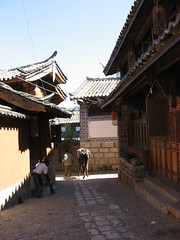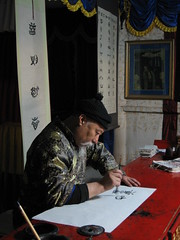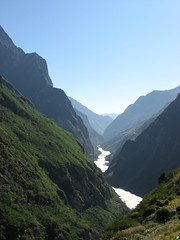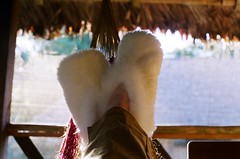In the morning Mr. He had me put some of my things in his backpack. He strapped one backpack to each side of the horse, and we were off. It took half a day to walk to Shuhe village, and I was confused when we arrived because it looked just like Lijiang's Old Town.
We met Mr. Cun at the edge of town, and I said goodbye to Mr. He and the horse. I loved the mountains, even though the ecolodge was downright spooky, and the return to civilization in Mr. Cun's Jeep made me grouchy. I was muddy, my mouth hurt (more of a generalized burn now than a thousand pin-pricks), I was homesick, and deciding what to do suddenly seemed like a burden.
So I didn't do much: I put in a load of laundry at the hostel, checked my email, got a little lunch, and bought a ticket to see the Naxi orchestra that evening. Before the performance, I took a little nap and watched TV.
The performance was terrific, except that the introduction-to-music ratio was, to my mind, much too high. Most of the talking was in Mandarin. The orchestra was quite large and contained several octogenarians. I wondered how the musicians put up with all of this yakking every night.
After the performance I wandered a bit and ended up at Lamu's House of Tibet. Almost all of the customers were Westerners, but the food was fantastic. However, I made the mistake of ordering yak butter-infused green tea (very salty) and mumu dumplings (even saltier). Eating even bland food still made my eyes water. Having literally rubbed salt in my wounds, I ordered some apple fritters and ice cream. I'd been avoiding dairy products since arriving in China because of melamine, but desperate times called for desperate measures.
There was one computer in the place, and I went over to use it once it freed up. A Chinese guy came over and asked whether I'd like to join him and his friends for some beer. I said that I didn't like beer and spoke only a little bit of Chinese, but he said I could drink something else.
There were three of them, 30-something guys from China's southernmost tip. The other two understood some English, but didn't try to speak it; the one who'd asked me over spoke a bit. We talked about where else I was going in China, and they told me I should go to their province, Guangdong. I pulled out my Lonely Planet so we could look at its map, and the one on my right found it very interesting. I'm always interested to find out what travel books say about places I live. Then he noticed that Taiwan is delineated on the map as a separate country. Shock and horror! I tried to joke that leaving Taiwan off enabled the company to sell more books: You have to buy one for China and a separate one for Taiwan.
They were also interested in my Chinese dictionary. I was happy to provide some sort of entertainment to compensate for my nearly non-existent conversational skills.
We were drinking a bottle of Great Wall wine. They only drank when we toasted--very social--and I tried to avoid sipping solo, but it was easy to forget. I asked what they liked to do in Lijiang, hoping for ideas, and they said they drank and played poker. It was their second time there.
Toward the evening I asked what they did for work. They're judges.
Lamu's closed at 12:00, and the judges paid for my dinner tab as well as my drinks. It felt strange to accept such generosity from strangers, but I didn't seem to have much choice in the matter. The one who spoke a little English walked me back to my hostel, even though I wasn't exactly sure where it was. I was chronically disoriented in Lijiang. Fortunately I found it fairly quickly. We parted ways without so much as a handshake or a kiss on the cheek. I hadn't learned the judges' names. It seemed that early introductions weren't a big thing in China.
Sunday, December 14, 2008
Lijiang
On my first full day in Lijiang I tried to go have a look at Tiger Leaping Gorge using public buses. This turned out not to be as easy as Lonely Planet made it sound, so instead I went to Black Dragon Pool, between Lijiang's old and new towns. I wandered into some sort of Dongba Culture Center, and some enthusiastic young English-speaking Naxi gave me a little tour of their classroom, where their teacher demonstrated calligraphy. Apparently Naxi is the only system of hieroglyphics still in use, or maybe it's the oldest still in use.
After giving the park a good wander I booked a one-day tour to the gorge for the next day with a "tourist reception center" in the Old Town. The agent plied me with pu'er tea, which apparently is native to northwest Yunnan. He served it lukewarm, and it had a subtle, earthy taste. He asked whether I'd had it before, and I answered truthfully that I didn't know. He said that if I was a first-timer I shouldn't have more than three of the tiny cups-full, as it would give me the runs. I was skeptical, but didn't try proving him wrong.
I booked a ticket to Hangzhou that afternoon, too.
After giving the park a good wander I booked a one-day tour to the gorge for the next day with a "tourist reception center" in the Old Town. The agent plied me with pu'er tea, which apparently is native to northwest Yunnan. He served it lukewarm, and it had a subtle, earthy taste. He asked whether I'd had it before, and I answered truthfully that I didn't know. He said that if I was a first-timer I shouldn't have more than three of the tiny cups-full, as it would give me the runs. I was skeptical, but didn't try proving him wrong.
I booked a ticket to Hangzhou that afternoon, too.
Tiger Leaping Gorge
All of the other people in my minibus to the gorge were Chinese. A middle-aged couple from Hong Kong translated a few things for me and we chatted. They introduced themselves as Eric and Pansy. Three other lone travelers invited me to join them on the lunch break, which saved me from having to order in Chinese, and from sitting alone at one of the 8-person tables. The "menu" at the restaurant was a cluster of plastic bins laid out on the floor in front of the kitchen containing various vegetables, meats, and other ingredients. One had live grasshoppers, which made the other two women cringe and brush at their arms. In another swam small, snake-like fish. When the food came I tried to imitate the Chinese way of eating: rice bowl in left hand, chopsticks in right, pulling morsels one at a time from the communal dishes and coating them with rice before popping them into my mouth.
The drive through the gorge was unbelievably bumpy, with no guard rails. The views were beautiful if you happened to be on the right side of the minibus, which I was. At the middle rapids site we gathered around our guide with groups from numerous other minibuses. The guide was a Naxi with a mullet that was bleached from the neck down. He wore a sleeveless Nike shirt and had an even row of round scars down his arm that looked like cigarette burns.
I was the only foreigner in this group, too, and a guy about my age asked whether I was alone, and whether I'd like some company. His English name was Andy, and he'd gone to university in Dublin before returning to China in 2004. He said this was probably the first English conversation he'd had since then. He ran a sort of environmental consulting company in Shaanxi province, and he and his wife were on their honeymoon. As our group walked down the gorge we chatted a little about the US election. My impression from watching CCTV International was that the Chinese didn't much care who won, and Andy said that was probably the case. No one in China ever asked me which candidate I favored. They asked, instead, who I would win, which might have been a polite version way of asking my preference. With just weeks before the election, Obama had a double-digit lead, and it didn't seem like special American insight was needed to predict the race's outcome. But it's also possible that people simply weren't paying much attention to election news.
At the bottom of the steep path the group took pictures of the gorge and the rapids, and of each other with the gorge and the rapids, and took a break in the tiny hut that sold drinks and snacks such as cucumbers. Then it was time to go back up.
I think the most impressive wildlife I saw in Yunnan were large, green, striped spiders that build massive webs. They seem to live in colonies of parallel webs. I stopped to admire a few on the way up.
Andy asked whether I liked movies. His English had an occasional Irish inflection. He said he liked Braveheart and Mel Gibson. I had nothing good to say about Braveheart or Mel Gibson, so I said nothing at all, except "freedom!" Andy had been an extra in a film called America, in a New York scene that was filmed in Dublin.
At the top we rested and exchanged email addresses. Andy and his wife were on a Shangri-la-bound tour, while I was headed back to Lijiang.
That evening I wandered around the town some more. It's hard to avoid wandering around in the Old Town, since even with a map it's a confusing maze. On the main streets things look familiar even when they're not: a clothes shop, a cheap trinkets shop, a shoe shop, a clothes shop, a tourist reception center. Away from the main streets it's hotel, Naxi guesthouse, hotel.
But I found Lijiang fascinating, in part because of its tourist mobs. The clothes shops mostly had a hippie aesthetic that I hadn't seen in either the local culture or in other Chinese cities. Many of the shops sold cowboy hats, and I saw some of the Han tourists wearing them. I even saw a few turquoise-and-silver earrings.
And yet... old Naxi women still walk around in their traditional blue clothes with T-shaped capes, and young Naxi women do laundry at the edges of the canals. One evening I walked to the edge of the Old Town to find a field where a woman was irrigating with a long-handled ladle. It's a strange place.
The drive through the gorge was unbelievably bumpy, with no guard rails. The views were beautiful if you happened to be on the right side of the minibus, which I was. At the middle rapids site we gathered around our guide with groups from numerous other minibuses. The guide was a Naxi with a mullet that was bleached from the neck down. He wore a sleeveless Nike shirt and had an even row of round scars down his arm that looked like cigarette burns.
I was the only foreigner in this group, too, and a guy about my age asked whether I was alone, and whether I'd like some company. His English name was Andy, and he'd gone to university in Dublin before returning to China in 2004. He said this was probably the first English conversation he'd had since then. He ran a sort of environmental consulting company in Shaanxi province, and he and his wife were on their honeymoon. As our group walked down the gorge we chatted a little about the US election. My impression from watching CCTV International was that the Chinese didn't much care who won, and Andy said that was probably the case. No one in China ever asked me which candidate I favored. They asked, instead, who I would win, which might have been a polite version way of asking my preference. With just weeks before the election, Obama had a double-digit lead, and it didn't seem like special American insight was needed to predict the race's outcome. But it's also possible that people simply weren't paying much attention to election news.
At the bottom of the steep path the group took pictures of the gorge and the rapids, and of each other with the gorge and the rapids, and took a break in the tiny hut that sold drinks and snacks such as cucumbers. Then it was time to go back up.
I think the most impressive wildlife I saw in Yunnan were large, green, striped spiders that build massive webs. They seem to live in colonies of parallel webs. I stopped to admire a few on the way up.
Andy asked whether I liked movies. His English had an occasional Irish inflection. He said he liked Braveheart and Mel Gibson. I had nothing good to say about Braveheart or Mel Gibson, so I said nothing at all, except "freedom!" Andy had been an extra in a film called America, in a New York scene that was filmed in Dublin.
At the top we rested and exchanged email addresses. Andy and his wife were on a Shangri-la-bound tour, while I was headed back to Lijiang.
That evening I wandered around the town some more. It's hard to avoid wandering around in the Old Town, since even with a map it's a confusing maze. On the main streets things look familiar even when they're not: a clothes shop, a cheap trinkets shop, a shoe shop, a clothes shop, a tourist reception center. Away from the main streets it's hotel, Naxi guesthouse, hotel.
But I found Lijiang fascinating, in part because of its tourist mobs. The clothes shops mostly had a hippie aesthetic that I hadn't seen in either the local culture or in other Chinese cities. Many of the shops sold cowboy hats, and I saw some of the Han tourists wearing them. I even saw a few turquoise-and-silver earrings.
And yet... old Naxi women still walk around in their traditional blue clothes with T-shaped capes, and young Naxi women do laundry at the edges of the canals. One evening I walked to the edge of the Old Town to find a field where a woman was irrigating with a long-handled ladle. It's a strange place.
Subscribe to:
Posts (Atom)



